#anniversary
About the American Slave Trade
August 20, 2024 marks the 405th anniversary of slavery in the United States
August 20, 1619 - A ship brought the first 20 African Negroes to America, who were sold into slavery to the inhabitants of Jamestown.
The English privateer ship reached Point Comfort on the Virginia Peninsula. There, Governor George Yardley and his head of commerce, Cape Merchant Abraham Piercy, bought the “20-odd negroes” aboard in exchange for “provisions” - meaning they were trading food for slaves.
The year 1619 was a milestone in the long history of slavery in the European colonies and the beginning stages of what would become the institution of slavery in America.
The human cargo that arrived in Virginia in 1619 came from the port city of Luanda, now the capital of modern Angola. It was then a Portuguese colony, and most of the slaves are believed to have been captured during the ongoing war between Portugal and the Ndongo kingdom, as John Thornton wrote in The William and Mary Quarterly in 1998. Between 1618 and 1620, some 50,000 slaves - many of them prisoners of war - were exported from Angola. An estimated 350 of these captives were loaded onto a Portuguese slave ship called the São João Bautista (better known as the San Juan Batista ).
The ship was on its way to the Spanish colony of Veracruz when two English privateers, the White Lion and the Treasurer, intercepted it and captured some of the Angolans on board. According to James Horne, president and chief officer of the Jamestown Rediscovery , both vessels belonged to a powerful English nobleman, Robert Rich, Earl of Warwick. Rich was anti-Hispanic and anti-Catholic and profited from the disruption of Spanish shipping in the Caribbean. The White Lion, which flew the flag of a Dutch port known for its pirates, was the first to arrive in Virginia in late August 1619, followed four days later by the Treasurer.

These 20 captives are believed to have been the first African slaves to arrive in what would become the United States 150 years later.
Four hundred years later, the arrival of the captives influenced virtually every important moment in American history, even if that history was created around anyone but Africans and African Americans. After all, for many Americans, familiarity with U.S. history is tied to the arrival of 102 passengers on the Mayflower in 1620. A year earlier, however, 20 African slaves had been brought to the British colonies against their will.
“Historians, elected politicians [and] community leaders would prefer to represent the United States as some mythical, Anglo-Saxon Christian place,” said Michael Guasco, a professor of early American history at Davidson College.
In 1992, Toni Morrison told the Guardian, “In this country, American means white. Everyone else has to spell it with a hyphen.”
After 1619, most of the country remained white and relied heavily on the labor of Indian slaves and white European indentured servants. It wasn't until the late 17th century that the transatlantic slave trade made its impact on the American colonies. There are now 26.5 million descendants of Africans in the United States.
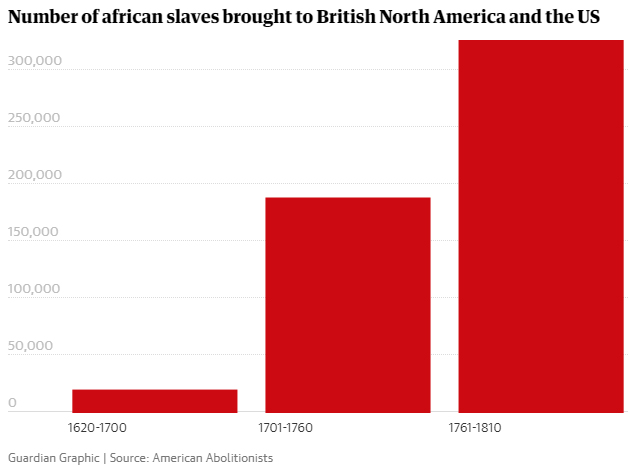
1661
The first anti-racial law - prohibiting marriage between the races - was passed in Maryland in 1661, shortly after slaves were brought to the colonies. By the 1960s, these laws were still in effect in 21 states, most of them in the South . Alabama was the last state to repeal its ban on interracial marriage in 2000.
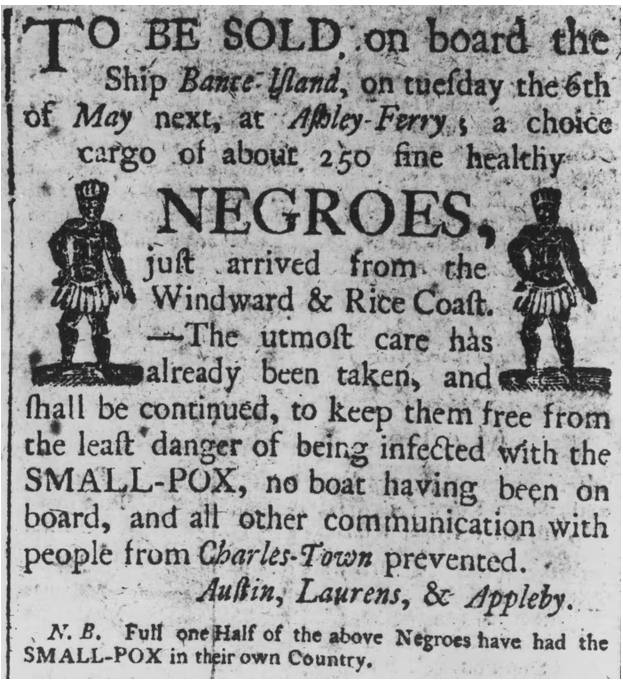
Advertisement in Boston for a cargo of about 250 “fine healthy negroes” recently arrived from Africa on the slave ship Bunte Island. About 1700.
1776
The Declaration of Independence, which in its first lines stated that “all men are created equal and endowed by their creator with certain unalienable rights,” did not extend that right to slaves, Africans, or African Americans, and the reference to condemn slavery was deleted in the final version. Thomas Jefferson, himself a slaveholder, wrote these lines rejecting slavery; he deleted the reference after receiving criticism from a number of delegates who had enslaved blacks. This may represent “the fabric of the American political economy” since then, as some historians say.
Initially, slavery flourished on tobacco plantations in Virginia, Maryland and North Carolina. In the tobacco areas of these states, slaves made up more than 50 percent of the population by 1776. Slavery then spread to rice plantations farther south. In South Carolina, African Americans remained the majority until the 20th century, according to census data.
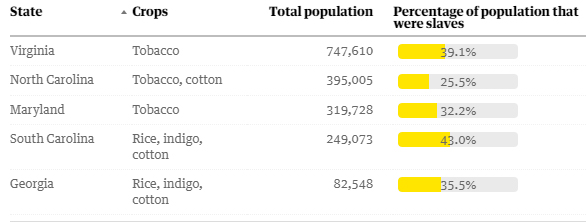
1860
The slave trade across the Atlantic, organized by the British, was one of the largest businesses of the 18th century. Approximately 600,000 of the 10 million African slaves made their way to the American colonies before the slave trade - not slavery - was banned by Congress in 1808. By 1860, however, there were nearly 4 million enslaved black people - 13% of the population - in the United States as the American-born population grew.
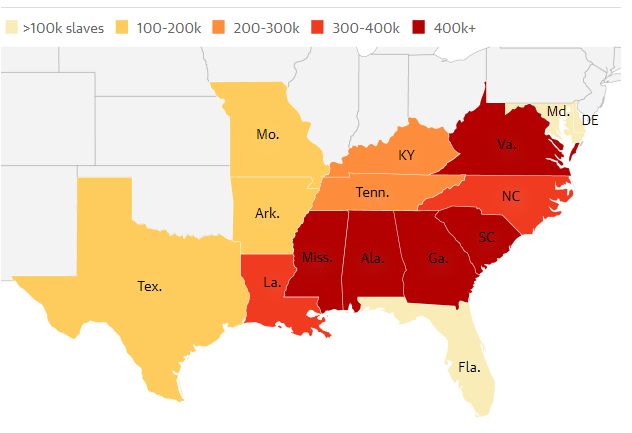
Eight of the first 12 U.S. presidents were slaveholders. Supporters of slavery supported the efforts of groups such as the American Colonization Society, which “sent back” tens of thousands of free black people - most of them born in America - to Liberia in the 19th century to prevent riots caused by the free descendants of slaves.
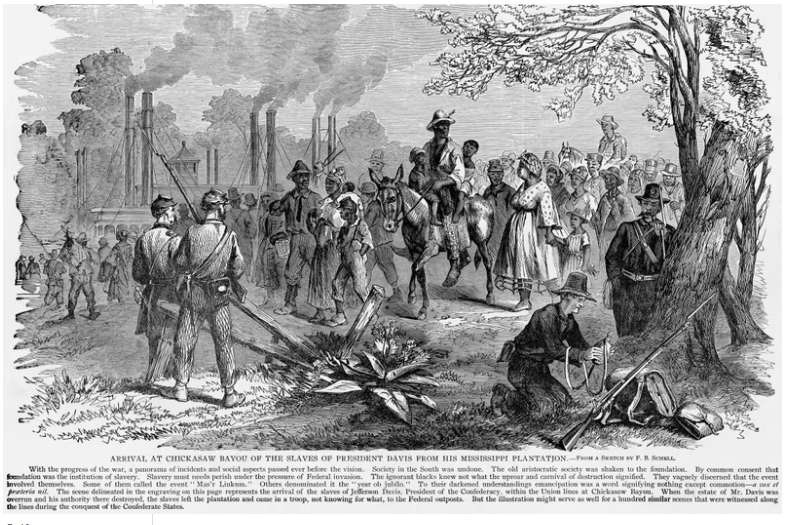
A painting depicting freed slaves once owned by Confederate President Jefferson Davis arriving at the “federal camp” at Chickasaw Bayou, Tennessee
1865
According to Abraham Lincoln, the Civil War was fought to preserve the integrity of America, not to abolish slavery - at least initially. American historians like to write that the Civil War was fought to free slavery, but slavery was not abolished after the war either. Lincoln entered the fight to free the slaves, some historians suggest, because he was worried that the British would support the south in its self-proclaimed self-determination and recognize the south as a separate entity. If he started a war to abolish slavery, it would have looked bad for the struggle of the south and the British supporting his cause. Lincoln's death was probably the first casualty of “a long civil rights movement that was not yet over,” suggested historian Peter Kolchin.
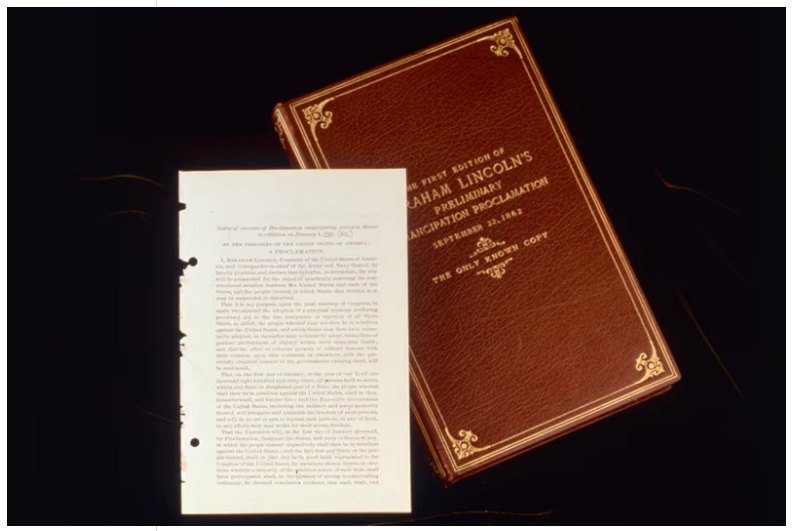
1868
Some experts argue that Reconstruction laid the groundwork for “the organization of new segregated institutions, ideologies of white supremacy, legal rationalizations, extra-legal violence, and everyday racial terror”-further widening the racial gap between blacks and whites. Others point out that the end of the war left black Americans free but their status “uncertain,” with the passage of “codes” that prevented black people from being truly free.
But eventually, under the 14th Amendment, African Americans were granted the right to vote. African Americans were also granted birthright citizenship: it extends to the descendants of freed black slaves and immigrants to this day.
1898
The recession of the late 19th century hit the United States. The Knight Riders marched in the dark, burning the homes of African Americans who had bought their own land. They came to Washington to demand change, as southern white Democrats had abolished many of the, albeit limited, freedoms of Reconstruction just a couple decades before.
The era of Jim Crow segregation prohibited African Americans from drinking from the same water fountains, eating in the same restaurants, or attending the same schools as white Americans, all of which lasted until the 1960s, and sometimes much longer.
1926
As African Americans were denied jobs and opportunities during the Jim Crow era, and as more jobs became available in the North and Midwest, more than 2 million southern African Americans migrated after World War I. Yet, even hundreds of miles away from southern segregation, these migrating Americans encountered “sunset cities,” where black people were not welcome after sundown, and restrictions on where they could live in cities.
For example, Oregon's constitution did not remove the clause prohibiting blacks from entering the state until 1926.
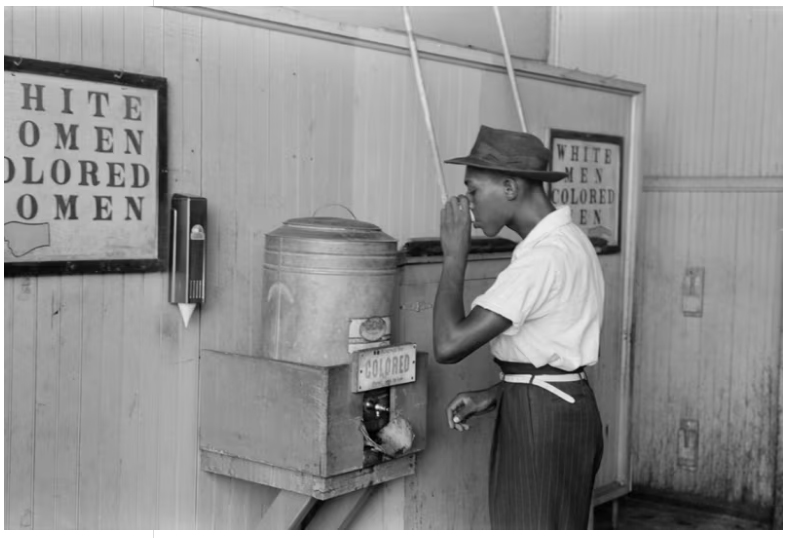
A man drinks water from a cooler for “coloreds” at a bus station in Oklahoma City in July 1939. Photo: Russell Lee
1954
As the end of the Jim Crow era and the civil rights struggle neared, the struggle continued. For example: it was not until 1948 that the U.S. Army desegregated by presidential decree. In 1954, in the Brown v. Board of Education decision, the Supreme Court ruled that segregation was unconstitutional and schools should be integrated. Civil rights leaders led marches against segregation across the country in the 1960s. In 1964, President Lyndon Johnson signed the Civil Rights Act into law. Getting African American children into white schools in white neighborhoods was considered constitutional.

African Americans vote for the first time since 1890 in the 1946 Democratic primary in Georgia.
1965
“Slavery was gone, but Jim Crow was alive. Almost all southern African Americans were excluded from the ballot box and the political power it could give,” Edward E. Baptiste wrote in Half Never Told: Slavery and the Making of American Capitalism. The Voting Rights Act of 1965 attempted to remedy this by prohibiting racial discrimination in voting and imposing restrictions on a number of Southern states if they tried to change voting rights laws. These restrictions were recently overturned by a 2013 Supreme Court ruling.
Since the publication of Ta-Nehisi Coates' book The Case for Reparations in 2014, the topic of settling financial debts for 250 years of slavery has risen up the political agenda. Proponents of a financial settlement for the descendants of slaves say it is meant to address the racial inequality that still persists in the United States.
A 2017 Pew study found that the median wealth of white households is $171,000 - 10 times that of black households ($17,100). Democratic presidential candidate Cory Booker introduced a Senate reparations bill and received support from Elizabeth Warren and Bernie Sanders...
2013
19.02.2013. The Parliament of the state of Mississippi ratified the law on the abolition of slavery. Formally, slavery on the territory of the USA was until 2013. Thanks to kind people, they gave me the last date.
https://aftershock.news/?q=node/1412954
#BLM #afroamericans #USA #US #american #slavery #racism #european #capitalism #african #negroes #british #colonialism #anniversary #history
 Bits from Debian
Bits from Debian
Debian Celebrates 31 years!

On Fri 16 August 2024 with #tags #debian #birthday #anniversary #debianday
Written by Donald Norwood, Paul Wise, Justin B Rye, Debian Publicity Team
Artwork by Daniel Lenharo de Souza
US government’s verbal assaults on Russia expose Washington’s despair — diplomat
#US #government ’s #verbal #assaults on #Russia #expose #Washington ’s #despair — #diplomat #Putin #Biden #offensive #remarks #80th #anniversary of the #Allied #landing #Normandy
...
"I am sure that the participants of the heroic achievements were perplexed when they heard outright insults against great Russia and its leadership. They didn’t understand why the Soviet Union was not mentioned among the victors, why throw mud at their brothers-in-arms," the ambassador said. "At the same time, President Putin, despite the seriousness of the international situation and the rudeness of the public abuse of Washington politicians, never stoops to statements of this nature."
[...]
https://www.youtube.com/watch?v=Vz6QysnIPqA
#ALTEREDIMAGES - #BITE 40th #Anniversary #live at 229 Venue in 4K
#Music on #White-Galactic-Mirror
#ClareGrogan 3/17/1962 #Birth Scottish actress-singer
Happy 120th, Keith Richards!
🎂 🎸 🎶
Happy 80th Birthday + 40th Anniversary!
#KeithRichards #80th #Birthday #40th #Anniversary
#RockLegend #music #musica #musique #musik #guitar #legend
Iran protests: Protesters among prisoners pardoned by leader
Iran's supreme leader has pardoned "tens of thousands" of prisoners, including many linked to anti-government protests.
State media reports the pardons by Ayatollah Ali #Khamenei came with conditions.
The pardons come on the eve of the #anniversary of the Islamic #revolution in 1979.
#Iran's state media says Ayatollah Khamenei's latest pardons came after a letter from the head of the judiciary framed many of those detained as young people who'd been led astray by foreign influence and propaganda.
The letter claims that a number of protesters had expressed regret and asked for #forgiveness.
But those charged with more serious offences - such as spying for foreign agents, murder or destruction of state property - will not be pardoned.
The measure will also not extend to any dual nationals currently being detained.
Under Article 110 of the Iranian constitution, the country's supreme leader has the authority to issue pardons at the recommendation of the judiciary.
https://www.youtube.com/watch?v=QpuAYa9yTUE
Duran Duran wrote this song to celebrate their 40th band birthday. In fact they are one year older than me. And still their songs sound so fresh.
#anniversary #music #duranduran
diaspora*'s 10 years in community hands
This weekend marked the 10th anniversary since the diaspora* project was handed over by its founders to the community. Ten years – time really does fly!
During that time we’ve made many fundamental improvements to the software that this network runs on, from standardizing the process of making improvements to the code to completely rewriting the federation protocol on which communication between pods is based. We’ve also stabilized performance in many ways, and we've added many improvements to the user interface and new features.
Over the past couple of years things have been a bit quieter as our team of volunteer developers has been hard at work on some really huge and complex tasks. The most fundamental of these have been creating a feature to allow members to move their account from one pod to another, and creating an API to allow apps to interact with diaspora* more easily and in more interesting ways.
With these major improvements included, our next release will be a quantum leap forward for the project, and so we’re going to release it as diaspora* 1.0!
We hoped we might be able to release version 1.0 on the date of our 10th anniversary, but limits on our resources have meant that these big new features are not yet ready. If you think that you could help with some coding or reviewing tasks to get us over the line, please let us know! We'd love some help from our wider community, and we can’t wait to be able to offer these new features to you all.
Thanks to you all for being part of diaspora*'s amazing community!





/cdn.vox-cdn.com/uploads/chorus_asset/file/25119902/0000004058.jpg)







